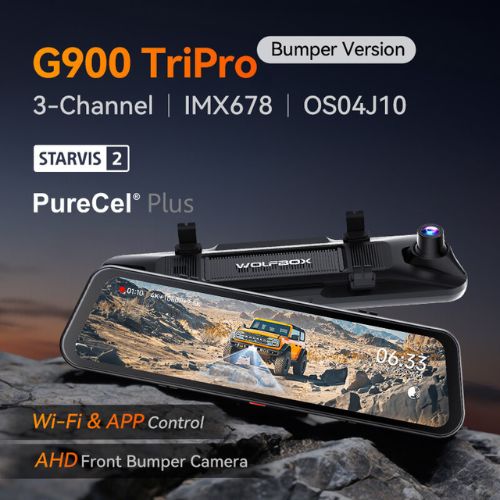Dash Cam Installation Guide: In-Depth Instructions for a Seamless Setup
Dash Cam Installation Guide: In-Depth Instructions for a Seamless Setup
Content Table
- Can you install a dash cam yourself?
- Front camera installation guide
- How to hardwire dash cam?
- Add-on fuse kit installation
- OBD hardwire kit installation
- Rear cam installation guide
- Let's hit the road
Can you install a dash cam yourself?
In today's world, many drivers rely on dash cams to document their journeys, protect themselves from false claims, and enhance overall safety. But you may be wondering whether you can handle the dash cam installation process on your own. The good news is that installing a dash cam doesn't have to be a daunting task. With the right tools, basic knowledge, and our in-depth installation guide, you can confidently set up your dash cam and start enjoying its benefits.
Now let’s dive into the installation process!
Front camera installation guide
To start with the installation process, let's familiarize ourselves with the components of a typical dash cam package. In addition to the front camera itself, the package usually includes such as rear cam, a power cable, hardwire kit,mounting bracket, adhesive or suction cup mount, and user manual.(Take WOLFBOX G900 model as an example)
Once you have everything ready, let's take a closer look at the front camera. On the camera unit, you'll find ports for power input, usually a TYPE-C port, and additional port for connecting an optional rear camera and GPS module.

Now if you don't plan on using the parking monitor function, the front cam installation doesn’t require a hardwire kit, which becomes even simpler. In this case, the dash cam can be securely mounted using straps that wrap around the rearview mirror bracket. Adjust the straps to ensure a snug fit. Position the camera correctly, with the lens facing outward to capture an unrestricted view.
If the provided straps for front camera installation do not meet your requirements, Wolfbox offers an OEM bracket as an alternative solution. The OEM bracket provides a more secure and stable installation for your dash cam compared to the straps. By using the OEM bracket, you can minimize the shaking or movement of the dash cam while driving, ensuring clear and steady footage.
Next is to locate the power source for the device. Connect the dash cam's power cable to the power source, also known as the cigarette lighter socket, in your vehicle. Once the power connection is established, you'll notice the dash cam powering on.
How to hardwire Dash Cam?
Hardwiring your dash cam becomes necessary if you want to utilize advanced features like the parking monitor function, which requires continuous power even when your car is turned off. Although hardwiring may be slightly more complex than the basic installation, we will guide you through three different scenarios based on the type of dash cam hardwire kits available, ensuring you can take full advantage of your dash cam's capabilities.
Single Fuse Hardwire Kit
The single fuse hardwire kit comes with the product package. It consists of three wires: an earth cord, an ACC wire (red), and a BATT wire (yellow).

- Earth Cord: This wire is used to connect to the ground bolt in your vehicle. It ensures proper grounding for the dash cam.
- ACC Wire: The ACC wire provides power to the dash cam when the ignition is turned on. It connects to a fuse slot that supplies power when the accessory or ignition is active.
- BATT Wire: The BATT wire provides constant power to the dash cam, even when the ignition is off. It connects to a fuse slot labeled "Battery," "Constant," or "Always-On."

Begin by locating the fuse box in your vehicle and identifying appropriate empty fuse slots. But before inserting the wire, it's important to ensure that this hardwire kit is compatible with your vehicle's fuse box. You can do this by checking the wire's specifications and comparing them to the fuse box requirements
Take off the fuse box cover, and there will be some reference on the cover, or you can find in the vehicle 's manual. The diagram will indicate the various fuse slots and their functions. For example, you have to avoid the fuses in charge of airbags, stability control programs, horns, indicators, looking for empty fuses that deal with components like the AC, radio, sunroof, boot opener.

For added assurance, you can use a multimeter or a circuit tester to verify that the identified empty slots have power when the ignition is on (for the ACC wire) or at all times (for the BATT wire). This step ensures that the chosen slots are suitable for connecting your dash cam's power cables.
For the earth cord, inspect the area near the fuse box: Often, you can find grounding points near the fuse box or under the dashboard.
Add-on fuse hardwire kit installtion
Now we are talking about the multifunctional hardwire kit. Installing this add-on fuse kit is a more convenient and straightforward process. It is more flexible and no need to find an empty fuse slot. Here are the steps for hardwiring your dash cam with add on fuse kit:
Identify the appropriate add-on fuse variation: Add-on fuse kits often come with multiple variations to accommodate different fuse box configurations. Determine which variation suits your specific fuse box setup.

Locate available fuse slots based on function: Refer to your vehicle's fuse box diagram to identify available fuse slots and their corresponding functions. Look for slots labeled with terms like "Accessory" or "Ignition" for the ACC (accessory power) wire connection, and slots labeled "Constant" or "Always-On" for the battery power (BATT) wire connection. These slots will provide the appropriate power source for your dash cam.

Test the output and input sides: Use a voltmeter or circuit tester to determine the voltage output and input sides of the fuse slots. Test each side individually. If a reading of +/-12.0V / 24.0V or a similar voltage appears on your voltmeter, mark it as the voltage INPUT side. The voltage OUTPUT side will display 0.0V because no current passes through it. Make sure to carefully insert the fuse into the fuse slot in the correct direction, ensuring a proper connection.
Insert the original fuse tap on the add-on fuse kit: Once you have identified the voltage INPUT and OUTPUT sides, insert the original fuse into the appropriate slot on the add-on fuse tap. This ensures the original circuit remains intact while allowing the add-on fuse kit to draw power from the selected fuse slot.
Connect the grounding point: Locate a suitable grounding point in your vehicle, such as a metal bolt or bracket. Connect the ground wire from the add-on fuse kit securely to the chosen grounding point. Ensure that the grounding point is free from rust, paint, or any other coatings that may impede electrical conductivity.
OBD Hardwire kit installation
An OBD (on-board diagnostics) cable for dash cams provides an even simpler and more convenient method for parking-mode recording over the traditional fuse box hardwiring method. All vehicles manufactured since the mid-to-late 1990s have OBD ports and thus all modern vehicles fit universally for OBD cables.

The OBD port is typically located in a readily accessible area within the vehicle, such as under the steering wheel or near the driver's side fuse box. When using the OBD connection, you typically need a specific OBD power cable to connect the dash cam directly to the OBD port, which provides a continuous power source for the dash cam and enables certain functionalities.
No matter which method you choose, we are pretty much clear with the front cam installation and especially hardwire dash cam, now let’s move on to the rear camera installation!
Rear Cam Installation
To set up the rear camera installation,you need first to locate the mounting spot: Choose a suitable location to mount the rear camera. Consider the best angle and visibility for capturing the rear view. The most common position is above the license plate. This placement often offers a clear view of the rear area and ensures optimal coverage. In some cases, you may need to drill holes to securely mount the camera.
Wolfbox also offers a plate bracket that provides a convenient and hidden mounting option. The plate bracket is designed to be installed on the license plate using screws, ensuring a secure and stable attachment that will not loosen over time.

However, it's important to note that depending on individual preferences or specific vehicle requirements, you may find other suitable positions for the rear camera. Some people choose to mount it on the rear window, bumper, or even inside the vehicle.



Wiring to the power wire of the reversing light: Connect the rear camera's red wire to the power source of the reversing light. This allows the rear view to automatically turn on when you shift into reverse. To access the reversing light wiring, you may need to remove the light cover or assembly. This can usually be done by unscrewing or unclipping the cover.
Once you have completed the installation of the rear camera, the next step is to connect it to the front camera. Regarding the wire hiding process, we understand that it can be a hassle. However, we recommend taking the time to carefully route and hide the wires to achieve a clean and professional installation.
Let's hit the road
Now the dash cam installation is all set, let's hit the road and prepare to be amazed by how the it works out for you.


